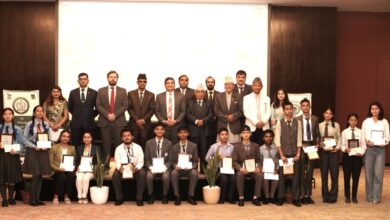China and Russia Challenge U.S. Dominance

# By Prem Sagar Poudel
A recent decision by the U.S. government has introduced a profound shift in American strategy, which may have significant implications in the future. On Palm Bondi’s first day as U.S. Attorney General, the decision was made to dismantle the FBI’s Foreign Influence Task Force and reduce the use of the Foreign Agents Registration Act (FARA). This decision signals a major change in the ideological stance on foreign interference in the U.S., while also implicitly acknowledging that the fear of foreign intervention in America is not a real concern.
Following the tradition of the U.S. Democratic Party, the issue of “foreign interference” has long been used as a political tool. This concept has facilitated the creation of public opinion by presenting opposition parties as engaging in dangerous “foreign influence,” making it easier to shape narratives and influence investigations. For instance, the allegations of “Russian interference” in the 2016 U.S. presidential election garnered global attention, yet no solid evidence was ever presented, and to this day, none has been.
However, Bondi’s decision clarifies that the overarching allegation of “foreign interference” is a myth that plays no real role in posing a genuine threat to the U.S. If foreign interference were truly a threat to America, the FBI would have dedicated all its resources to investigating it. Instead, this move reflects internal political maneuvering among U.S. policymakers. The fear of “foreign interference” in the U.S. had essentially become a political weapon aimed at internally discrediting other major global powers.
As the U.S. reevaluates its foreign relations, it is important to deeply analyze the strategic perspectives of Russia and China. These two nations, especially China and Russia, have been taking steps to address their national security and internal issues without making any serious attempts to influence the American political structure.
Strategic Perspectives of China and Russia:
China and Russia are making strategic moves to address both their internal concerns and their positions in the global power context. From Russia’s perspective, countering Western influence and expansion is vital, while China’s goal is to expand its power and influence on the world stage. Both nations have focused on safeguarding their long-term strategic interests without intervening in the political framework of the U.S.
From Russia’s military standpoint, the Kremlin has played an active role in various regional conflicts to maintain a solid presence in the competition with Western powers. Examples include Russia’s pressure on Ukraine and its expanding influence in the Middle East. China’s strategic approach, on the other hand, seeks to expand global trade and diplomatic influence through its “Belt and Road Initiative.” This initiative has allowed China to challenge American dominance while strengthening its role in world trade.
Global Impact and Evidence:
The global impact of China’s and Russia’s strategic approaches is evident. China’s “Belt and Road Initiative,” involving over 140 countries, directly challenges U.S. influence. Similarly, Russia has expanded its military and diplomatic reach in the Middle East and Africa, further disrupting American dominance. Through their regional and global strategies, both nations are increasing their influence, creating long-term doubt about the sustainability of American power.
Conclusion:
The U.S. is now reassessing its definition of “foreign interference” and has begun to view the strategic approaches of China and Russia through a new lens. The perspectives of these nations clearly demonstrate that they have been strengthening their internal and global strategic goals without any serious attempts at foreign interference. This shift contributes to the creation of a new international perspective that will pose a real challenge to U.S. dominance and the global power structure in the future. Middle and developing nations like Nepal should take lessons from this shift and maintain a balanced role to safeguard their interests.







